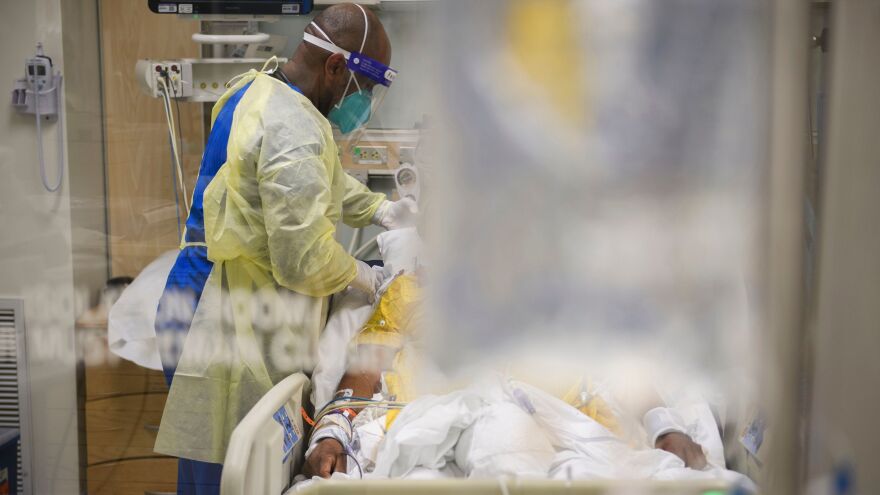This story is free to read because readers choose to support LAist. If you find value in independent local reporting, make a donation to power our newsroom today.
A new California law will scrub most medical debt from credit reports

Californians’ credit reports will be safe from most medical debt in the coming year under a new law Gov. Gavin Newsom signed today.
Medical debt can hurt people’s credit scores and harm their chances of negotiating a loan or mortgage on favorable terms. The law will not forgive someone’s debt, but by keeping it off credit reports, it might provide some reassurance that Californians won’t suffer more financial repercussions because of a medical balance.
“No Californian should be unable to secure housing, a loan, or even a job because they accessed necessary medical care,” said Sen. Monique Limón, a Santa Barbara Democrat who authored the law. “With this new law, California is stepping up to protect consumers.”
Her legislation was backed by Attorney General Rob Bonta and consumer advocacy groups. Limon and supporters contended that medical debt should not be treated like other kinds of debt because people incur it through no fault of their own. Experts and consumer advocates say medical debt is also more prone to inaccuracies because of mistakes in billing or disputes with insurers.
“With ballooning out-of-pocket health care costs, we need a fair credit system that does not punish California’s patients for seeking health care when they need it,” said California Nurses Association President Michelle Gutierrez Vo in a written statement commending Newsom’s signature of the new law.
The law has a loophole that lawmakers created late in the legislative session — it will not apply to debt charged to so-called medical credit cards.
Bankers and lenders lobbied to exclude medical credit cards from this bill. They said medical credit cards can be used for non-urgent services, including gym memberships and cosmetic procedures. Instead the law will apply only to debt owed to a medical provider, such as a hospital or doctor’s office.
The federal government is moving forward with a similar rule to California’s, but the timing on that proposal is uncertain. Newsom’s signature allows California to move quicker with an implementation date of Jan. 1. With this signature, California joins other states, including New York and Connecticut, in barring medical debt from credit reports.
As medical debt increasingly burdens Americans, local and state governments are looking to provide some type of relief for residents. Other states, such as New York and New Jersey, have tapped into medical forgiveness programs. North Carolina is working with medical providers to negotiate incentives in exchange for debt relief.
In California’s most populous county, Los Angeles, this summer approved a pilot program to cancel $500 million worth of medical debt for 150,000 residents. Los Angeles officials estimate that residents are carrying $2.9 billion worth of medical debt.
Supported by the California Health Care Foundation (CHCF), which works to ensure that people have access to the care they need, when they need it, at a price they can afford. Visit www.chcf.org to learn more.
-
Recent attacks by people who professed white nationalist and neo-Nazi sympathies but are not white themselves have raised a question: Why are some people of color drawn to white supremacist ideology? The answer is complicated.
-
The last time one of the animals was seen in California was in 2008, and prior to that the most recent sighting occurred in 1922.
-
Meet P-113, P-114, and P-115! These mountain lion kittens are just a few weeks old.
-
Our winter weather could see the biggest impacts.
-
Cruise off the highway and hit locally-known spots for some tasty bites.
-
Fentanyl and other drugs fuel record deaths among people experiencing homelessness in L.A. County. From 2019 to 2021, deaths jumped 70% to more than 2,200 in a single year.















